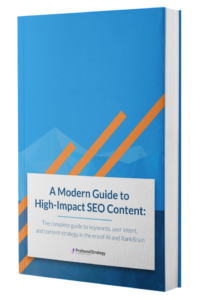SEO Keywords and Content Strategy for an Era of A.I. and RankBrain [PDF]
What I’m about to tell you is going to change your world forever.
Remember the day you realized you’ve always seen a G in Walt Disney’s signature, even though that doesn’t make any sense at all? Or when you realized the word speedometer is really just speed-o-meter, even though that makes perfect sense?
That’s what’s about to happen.
 (Also, you’ll hear “speed-o-meter” every time someone says “speedometer” for the rest of your life. You’re welcome.)
(Also, you’ll hear “speed-o-meter” every time someone says “speedometer” for the rest of your life. You’re welcome.)
Can’t wait? Download the new ebook, A Modern Guide to High-Impact SEO Content now.
It’s [(Way) Past] Time to Update Keyword and Content Strategies
Chances are, you’re doing keyword research and/or content strategies all wrong.

I know that sounds harsh (I deleted and retyped it three times), but I’ve scrolled past this conversation in too many Twitter chats:
Q: How does SEO contribute to your content/content marketing/content strategy?
A: So important! Before you publish ANYTHING, go back & identify important keywords so you can make sure you use them in the right places! #SEO
#wrong
And I’ve seen too many business owners sign service agreements for web dev that include a set number of hours—one time—for “SEO,” defined as (direct quote), “Plugging keywords into your content so you show up in Google.”
#itburns
Ask yourself if your team or your content is suffering from some of the side-effects of outdated keyword and content strategies:
- Content marketers struggling to fill up a content calendar.
- Great blog posts that don’t seem to connect with your audience.
- Landing pages that do everything right, but still don’t rank well in organic search.
- Libraries of brand content that don’t create conversions.
- Passionate declarations that “keywords are dead” or “SEO doesn’t convert.”
It ends today. Because today, we bring you a gift.
A Modern Guide to High-Impact SEO Content
We started developing this PDF as an internal resource for training new hires and sharing with clients. When we finalized the copy one Senior Account Strategist exhaled, “I’ve been waiting two years for this!”

Because our team has spent years developing and honing this process. Industry standards, Google updates, and—mostly—our own content wins and misses are all tested and embedded in this strategy. (And, honestly, handing it over makes me a little nervous.)
We use this process with every client. Sometimes it generates game-changing insights, and other times it kicks off and nurtures steady growth. But it always works.
Across B2B and B2C industries—from healthcare to SaaS, and digital marketing to logistics—this is the keyword and content strategy that works, because it answers your real audience and it does so on Google’s terms.
Add User Intent and Start Creating Content that Works
Spoiler: the secret ingredient is “user intent.” It’s the real question or need behind the query. The good news is that Google is intensely invested in reading people’s minds and delivering exactly what they’re looking for.
That means all you have to do is learn how to reverse engineer SERPs to draw out Google’s insights. And it’s not that difficult once you know what you’re looking at. Google has already done the hard part for you.

So before you post another blog post for the sake of consistency or survey your client base for topic ideas—before you attempt to use keywords retroactively or mimic what seems to be working for the competition—check out A Modern Guide to High-Impact SEO Content. You’ll learn:
- How to organize and prioritize a keyword list.
- How to draw user intent insights out of SERPs.
- How to use user intent to create content that tours the buyer’s journey.
- How to identify your real, online audience(s).
(And, of course, more.)
And all of that means your blog posts will engage your real online audience, your landing pages will start to climb through Google SERPs because they answer user intent, and you’ll have the insights you need to create content that converts.
Ready to get started? Download your copy of the ebook now and take it with you.
What's Next?
Profound Strategy is on a mission to help growth-minded marketers turn SEO back into a source of predictable, reliable, scalable business results.
Start winning in organic search and turn SEO into your most efficient marketing channel. Subscribe to updates and join the 6,000+ marketing executives and founders that are changing the way they do SEO:
And dig deeper with some of our best content, such as The CMO’s Guide to Modern SEO, Technical SEO: A Decision Maker’s Guide, and A Modern Framework for SEO Work that Matters.




